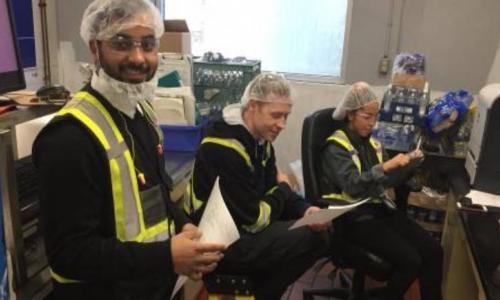
Get Your Portfolio in Check
The advantage of participating in Co-op is the fact that students walk away from their placements with an awesome start to their portfolio! Quentin Beck, the Online Community Coordinator, and Amy Lee, the International Co-op Coordinator, have some helpful advice on how to make the most out of portfolio pieces created during this placement:
-
Select samples that best showcase your skills and talents
-
Make notes about each item so you can provide annotation/context in future job interviews
-
Keep both hard and electronic copies
-
Be sure to review pieces with your supervisor to ensure that there is no concern with confidentiality
-
If your job involved creative or newsletter article writing, be sure to include non-academic writing samples into your portfolio
Consider updating your resume before you leave your position. Your employer is perhaps the best resource for helping you perfect the accomplishment statements relating to your position.
Help Transition Your Replacement (If Applicable)
Training the lucky replacement allows you to reflect on the tasks accomplished and identify the skills that were crucial to your role. (Not to mention that you’ll make starting a new job much easier for your replacement!) In addition, it shows that you’re a conscientious and responsible employee. John Grant, Manager of SFU Alumni Relations, provides some tips on how you can accomplish this.
-
Leave as much detailed information as possible to provide a guide for the new worker, including:
-
Information about key contacts
-
Archived emails
-
Electronic/hard copies of the work you’ve done
-
Details on important processes your position involves (i.e. how to perform specific administrative duties)
-
A document directory of the files left on your computer
-
-
Leave your workspace clean and tidy so that the new hire can pick right up where you left off and hit the ground running!
The Wrap-up Meeting with Your Supervisor
When approaching your supervisor to complete the evaluation forms, be sure to set aside at least thirty minutes with him/her to discuss all the things you’ve accomplished during the work term. Engineering Science Co-op Program Manager, Harriet Chicoine advises:
-
With your supervisor, assess what you have learned and/or improved upon over the work term as well as what you were able to contribute to the company/team
-
Use this opportunity to see if your supervisor would be willing to be a future reference and (if yes) to request a business card and perhaps a personal contact in case they leave the company
-
If you are extending your work term for an additional four months, use this appointment to ensure that your expectations are in line with your supervisors’ and that you are continuing to meet your learning objectives
Secure and Maintain the Network You’ve Developed
Co-op gives students the opportunity to develop contacts within industries related to their academic degree. Communication Co-op Coordinator, Marcia Shimizu, says, “10-12% of jobs are actually posted, meaning that the remainder of positions are filled through personal references”. Here, Marcia Shimizu, Stuart Billings, the Biology Co-op Coordinator, Tony Botelho, the Career Services Associate Director, and I have some suggestions on how to make the most of, secure, and maintain your list of contacts after you depart.
-
Create a list of the people you met and worked with (try starting with a word document or a Rolodex of business cards). Include details on how you met, who was your connection, which industry they worked in, and perhaps what was recently discussed.
-
Gain as much insight as possible from your co-workers and supervisors in regards to hot industry trends and key skills/experience employers look for
-
This can help you decide what path to follow for future Co-op terms or post-graduation!
-
Before you go, let your contacts know where YOUR interests lie and where you would like to see yourself in case (in the future) they might know of a position that would be a great fit for you.
-
These contacts are relationships, so be sure to keep them alive and well between now and the next time that you are looking for a job.
-
Using birthdays and the holidays as opportunities to check in with contacts once or twice a year can be a more sincere approach to accomplishing this.













